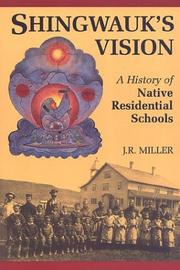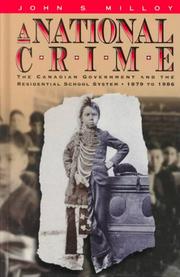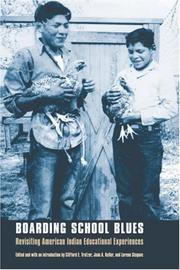| Listing 1 - 10 of 27 | << page >> |
Sort by
|
Book
ISBN: 1771082151 9781771082150 Year: 2014 Publisher: Halifax, [Nova Scotia] : Nimbus Publishing,
Abstract | Keywords | Export | Availability | Bookmark
 Loading...
Loading...Choose an application
- Reference Manager
- EndNote
- RefWorks (Direct export to RefWorks)
In Indian School Road, journalist Chris Benjamin tackles the controversial and tragic history of the Shubenacadie Indian Residential School, its predecessors, and its lasting effects, giving voice to multiple perspectives for the first time. Benjamin integrates research, interviews, and testimonies to guide readers through the varied experiences of students, principals, and teachers over the school's nearly forty years of operation (1930-1967) and beyond. Exposing the raw wounds of Truth and Reconciliation as well as the struggle for an inclusive Mi'kmaw education system, Indian School Road is a comprehensive and compassionate narrative history of the school that uneducated hundreds of Aboriginal children.
Micmac Indians --- Abused Indian children --- Residential schools. --- Shubenacadie Indian Residential School. --- Mi'kmaq

ISBN: 080200833X 0802078583 Year: 1966 Publisher: Toronto ; Buffalo ; London University of Toronto Press
Abstract | Keywords | Export | Availability | Bookmark
 Loading...
Loading...Choose an application
- Reference Manager
- EndNote
- RefWorks (Direct export to RefWorks)
Indigenous peoples --- Off-reservation boarding schools --- Autochtones --- Internats pour Indiens d'Amérique --- Education --- History --- Histoire --- History. --- Canada --- Residential schools

ISBN: 1283090554 9786613090553 0887553036 9780887553035 9780887554155 0887554156 9780887555190 0887555195 0887551661 9780887551666 0887556469 9780887556463 9781283090551 6613090557 9780887555213 0887555217 9780887557897 0887557899 Year: 2017 Publisher: Winnipeg, Manitoba
Abstract | Keywords | Export | Availability | Bookmark
 Loading...
Loading...Choose an application
- Reference Manager
- EndNote
- RefWorks (Direct export to RefWorks)
“I am going to tell you how we are treated. I am always hungry.” — Edward B., a student at Onion Lake School (1923) "[I]f I were appointed by the Dominion Government for the express purpose of spreading tuberculosis, there is nothing finer in existance that the average Indian residential school.” — N. Walker, Indian Affairs Superintendent (1948) For over 100 years, thousands of Aboriginal children passed through the Canadian residential school system. Begun in the 1870s, it was intended, in the words of government officials, to bring these children into the “circle of civilization,” the results, however, were far different. More often, the schools provided an inferior education in an atmosphere of neglect, disease, and often abuse. Using previously unreleased government documents, historian John S. Milloy provides a full picture of the history and reality of the residential school system. He begins by tracing the ideological roots of the system, and follows the paper trail of internal memoranda, reports from field inspectors, and letters of complaint. In the early decades, the system grew without planning or restraint. Despite numerous critical commissions and reports, it persisted into the 1970s, when it transformed itself into a social welfare system without improving conditions for its thousands of wards. A National Crime shows that the residential system was chronically underfunded and often mismanaged, and documents in detail and how this affected the health, education, and well-being of entire generations of Aboriginal children.
Off-reservation boarding schools --- Indians of North America --- American aborigines --- American Indians --- First Nations (North America) --- Indians of the United States --- Indigenous peoples --- Native Americans --- North American Indians --- Indian residential schools --- Non-reservation boarding schools --- Non-reservation schools --- Off-reservation Indian boarding schools --- Off-reservation Indian schools --- Off-the-reservation boarding schools --- Residential schools, Indian --- Boarding schools --- History. --- Education --- Culture --- Ethnology --- Social conditions. --- Government relations. --- Government relations --- Residential Schools, Canada, Canadian Goverment, Indigenous, First Nations, Indians, History, Reconciliation. --- residential school.
Book
ISBN: 9781487594381 1487594380 Year: 2017 Publisher: North York, Ontario, Canada University of Toronto Press
Abstract | Keywords | Export | Availability | Bookmark
 Loading...
Loading...Choose an application
- Reference Manager
- EndNote
- RefWorks (Direct export to RefWorks)
Truth commissions --- Ethnological jurisprudence --- Indians of North America --- Social aspects --- Government relations --- Truth and Reconciliation Commission of Canada. --- Commission de vérité et réconciliation du Canada --- TRC (Truth and Reconciliation Commission) --- Canada. --- Indian Residential Schools Truth and Reconciliation Commission (Canada) --- Truth and Reconciliation Canada --- Jurisprudence, Ethnological --- Comparative law --- Commissions, Truth --- Reconciliation commissions --- Governmental investigations --- Human rights --- Témoignage et réconciliation Canada --- Truth and Reconciliation Canada Commission --- Truth and Reconciliation Commission --- Indian Residential Schools Truth and Reconciliation Commission --- Indian Residential Schools Truth and Reconciliation Commission Secretariat --- Indian Residential Schools Resolution Canada.
Book
ISBN: 0887558550 0887558569 0887558542 0887558801 9780887558566 9780887558559 9780887558801 9780887558542 Year: 2020 Publisher: Winnipeg, Manitoba
Abstract | Keywords | Export | Availability | Bookmark
 Loading...
Loading...Choose an application
- Reference Manager
- EndNote
- RefWorks (Direct export to RefWorks)
"Since the Truth and Reconciliation Commission released its Calls to Action in June 2015, governments, churches, non-profit, professional and community organizations, corporations, schools and universities, clubs and individuals have asked: "How can I/we participate in reconciliation?" Recognizing that reconciliation is not only an ultimate goal, but a decolonizing process of journeying in ways that embody everyday acts of resistance, resurgence, and solidarity, coupled with renewed commitments to justice, dialogue, and relationship-building, Pathways of Reconciliation helps readers find their way forward. The essays in Pathways of Reconciliation address the themes of reframing, learning and healing, researching, and living. They engage with different approaches to reconciliation (within a variety of reconciliation frameworks, either explicit or implicit) and illustrate the complexities of the reconciliation process itself. They canvass multiple and varied pathways of reconciliation, from Indigenous and non-Indigenous perspectives, reflecting a diversity of approaches to the mandate given to all Canadians by the TRC with its Calls to Action. Together the authors -- academics, practitioners, students and ordinary citizens -- demonstrate the importance of trying and learning from new and creative approaches to thinking about and practicing reconciliation and reflect on what they have learned from their attempts (both successful and less successful) in the process."--
Truth and Reconciliation Commission of Canada. --- Commission de vérité et réconciliation du Canada --- Témoignage et réconciliation Canada --- TRC (Truth and Reconciliation Commission) --- Truth and Reconciliation Canada Commission --- Truth and Reconciliation Commission --- Indian Residential Schools Truth and Reconciliation Commission --- Indian Residential Schools Truth and Reconciliation Commission Secretariat --- Indian Residential Schools Resolution Canada. --- Canada. --- Indian Residential Schools Truth and Reconciliation Commission (Canada) --- Truth and Reconciliation Canada --- Truth commissions --- Indigenous peoples --- Reconciliation. --- Abuse of --- Canada --- Race relations. --- Peace making --- Peacemaking --- Reconciliatory behavior --- Quarreling --- Ethnology --- Commissions, Truth --- Reconciliation commissions --- Governmental investigations --- Human rights

ISBN: 1280550813 9786610550814 080325721X 9780803257214 0803244460 0803294638 9780803244467 9780803294639 6610550816 9781280550812 Year: 2006 Publisher: Lincoln University of Nebraska Press
Abstract | Keywords | Export | Availability | Bookmark
 Loading...
Loading...Choose an application
- Reference Manager
- EndNote
- RefWorks (Direct export to RefWorks)
Shows how American Indian boarding schools provided both positive and negative influences for Native American children. Offering comparative studies of the various schools, regions, tribes, and aboriginal peoples, this book reveals both the light and the dark aspects of the boarding school experience and illuminates the vast gray area in between.
Indians of North America --- Indian children --- Off-reservation boarding schools --- Indian residential schools --- Non-reservation boarding schools --- Non-reservation schools --- Off-reservation Indian boarding schools --- Off-reservation Indian schools --- Off-the-reservation boarding schools --- Residential schools, Indian --- Boarding schools --- Children, Indian --- Indians --- Children --- Indian inspectors --- Government relations. --- Education. --- Relocation --- History. --- Education --- Government policy --- United States --- Race relations. --- Social policy. --- Race question
Book
ISBN: 1438469160 9781438469164 9781438469157 Year: 2018 Publisher: Albany
Abstract | Keywords | Export | Availability | Bookmark
 Loading...
Loading...Choose an application
- Reference Manager
- EndNote
- RefWorks (Direct export to RefWorks)
Changed Forever is the first study to gather a range of texts produced by Native Americans who, voluntarily or through compulsion, attended government-run boarding schools in the last decades of the nineteenth and the first decades of the twentieth centuries. Arnold Krupat examines Hopi, Navajo, and Apache boarding-school narratives that detail these students' experiences. The book's analyses are attentive to the topics (topoi) and places (loci) of the boarding schools. Some of these topics are: (re-)Naming students, imposing on them the regimentation of Clock Time, compulsory religious instruction and practice, and corporal punishment, among others. These topics occur in a variety of places, like the Dormitory, the Dining Room, the Chapel, and the Classroom. Krupat's close readings of these narratives provide cultural and historical context as well as critical commentary. In her study of the Chilocco Indian School, K. Tsianina Lomawaima asked poignantly, "What has become of the thousands of Indian voices who spoke the breath of boarding-school life?" Changed Forever lets us hear some of them.
Off-reservation boarding schools --- Boarding school students --- Students --- Indian residential schools --- Non-reservation boarding schools --- Non-reservation schools --- Off-reservation Indian boarding schools --- Off-reservation Indian schools --- Off-the-reservation boarding schools --- Residential schools, Indian --- Boarding schools --- Indians of North America --- Education
Book
ISBN: 177112170X 9781771121712 1771121718 9781771121705 9781771121699 1771121696 Year: 2016 Publisher: Waterloo, Ontario
Abstract | Keywords | Export | Availability | Bookmark
 Loading...
Loading...Choose an application
- Reference Manager
- EndNote
- RefWorks (Direct export to RefWorks)
"It's about the role that music, film, visual art, and Indigenous cultural practices play in and beyond Canada's Truth and Reconciliation Commission on Indian Residential Schools. The essays question the ways in which components of the reconciliation, such as apology and witnessing, have social and political effects for residential-schools survivors, intergenerational survivors, and settler publics."--
Aesthetics --- Indian arts --- Arts, Indian --- Arts --- Beautiful, The --- Beauty --- Esthetics --- Taste (Aesthetics) --- Philosophy --- Art --- Criticism --- Literature --- Proportion --- Symmetry --- Social aspects --- Political aspects --- Psychology --- Truth and Reconciliation Commission of Canada. --- Commission de vérité et réconciliation du Canada --- Témoignage et réconciliation Canada --- TRC (Truth and Reconciliation Commission) --- Truth and Reconciliation Canada Commission --- Truth and Reconciliation Commission --- Indian Residential Schools Truth and Reconciliation Commission --- Indian Residential Schools Truth and Reconciliation Commission Secretariat --- Indian Residential Schools Resolution Canada. --- Canada. --- Indian Residential Schools Truth and Reconciliation Commission (Canada) --- Truth and Reconciliation Canada --- Radio broadcasting Aesthetics --- First Nations. --- Inuit. --- Metis. --- Truth and Reconciliation Commission on the Indian Residential Schools. --- aesthetics. --- apology. --- conciliation. --- film. --- literature. --- material culture. --- music. --- reconciliation. --- sensory studies. --- witnessing.
Book
ISBN: 1771124105 1771124083 1771124091 9781771124102 9781771124096 Year: 2020 Publisher: Waterloo, Ontario
Abstract | Keywords | Export | Availability | Bookmark
 Loading...
Loading...Choose an application
- Reference Manager
- EndNote
- RefWorks (Direct export to RefWorks)
Quebec author An Antane Kapesh's two books, Je suis une maudite sauvagesse (1976) and Qu'as-tu fait de mon pays? (1979), are among the foregrounding works by Indigenous women in Canada. This English translation of these works, each page presented facing the revised Innu text, makes them available for the first time to a broader readership. In I Am a Damn Savage, Antane Kapesh wrote to preserve and share her culture, experience, and knowledge, all of which, she felt, were disappearing at an alarming rate because many Elders -- like herself -- were aged or dying. She wanted to publicly denounce the conditions in which she and the Innu were made to live, and to address the changes she was witnessing due to land dispossession and loss of hunting territory, police brutality, and the effects of the residential school system. What Have You Done to My Country? is a fictional account by a young boy of the arrival of les Polichinelles (referring to White settlers) and their subsequent assault on the land and on native language and culture. Through these stories Antane Kapesh asserts that settler society will eventually have to take responsibility and recognize its faults, and accept that the Innu -- as well as all the other nations -- are not going anywhere, that they are not a problem settlers can make disappear.
Montagnais Indians --- Mountaineer Indians --- Algonquian Indians --- Indians of North America --- Innu Indians --- Antane Kapesh, An, --- Kapesh, An Antane, --- André, Anne, --- André, Anne --- Biography. --- Canada. --- Colonialism. --- Indigenous Language. --- Indigenous Literature. --- Indigenous. --- Innu. --- Life writing. --- Quebec. --- Residential Schools. --- Schefferville. --- Translation.
Book
ISBN: 022655287X Year: 2018 Publisher: Chicago : University of Chicago Press,
Abstract | Keywords | Export | Availability | Bookmark
 Loading...
Loading...Choose an application
- Reference Manager
- EndNote
- RefWorks (Direct export to RefWorks)
At the dawn of the radio age in the 1920s, a settler-mystic living on northwest coast of British Columbia invented radio mind: Frederick Du Vernet-Anglican archbishop and self-declared scientist-announced a psychic channel by which minds could telepathically communicate across distance. Retelling Du Vernet's imaginative experiment, Pamela Klassen shows us how agents of colonialism built metaphysical traditions on land they claimed to have conquered. Following Du Vernet's journey westward from Toronto to Ojibwe territory and across the young nation of Canada, Pamela Klassen examines how contests over the mediation of stories-via photography, maps, printing presses, and radio-lucidly reveal the spiritual work of colonial settlement. A city builder who bargained away Indigenous land to make way for the railroad, Du Vernet knew that he lived on the territory of Ts'msyen, Nisga'a, and Haida nations who had never ceded their land to the onrush of Canadian settlers. He condemned the devastating effects on Indigenous families of the residential schools run by his church while still serving that church. Testifying to the power of radio mind with evidence from the apostle Paul and the philosopher Henri Bergson, Du Vernet found a way to explain the world that he, his church and his country made. Expanding approaches to religion and media studies to ask how sovereignty is made through stories, Klassen shows how the spiritual invention of colonial nations takes place at the same time that Indigenous peoples-including Indigenous Christians-resist colonial dispossession through stories and spirits of their own.
Missionaries --- Bishops --- DuVernet, Frederick Herbert, --- Church of England in Canada --- British Columbia --- Church history --- Canada. --- Indigenous peoples. --- Settler-colonialism. --- maps. --- mediation. --- missionaries. --- photography. --- printing presses. --- psychic research. --- residential schools. --- spiritual politics. --- storytelling. --- whiteness.
| Listing 1 - 10 of 27 | << page >> |
Sort by
|

 Search
Search Feedback
Feedback About UniCat
About UniCat  Help
Help News
News